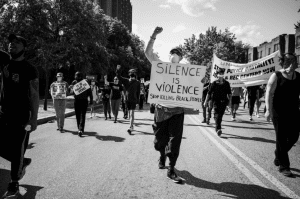
I’m hitting pause on my current series, to talk about the furor surrounding Brandt Jean’s stunning declaration of forgiveness for his brother Botham’s murderer, ex-cop Amber Guyger. Some of my readers may be surprised to learn that there is a furor, but it exists for some complicated reasons, and it’s pretty nuanced. Let’s start with the facts.
Amber Guyger (who was a Dallas police officer at the time) shot and killed Botham Jean in his apartment; she said she mistook the apartment for her own and thought Jean was an intruder. Whatever the truth of that statement, she was discharged from the police force, charged with murder, and has been convicted and given ten years in prison. After the sentence was pronounced, Brandt Jean took the stand. He said that he forgave Guyger and that God would forgive her, and asked the judge if he could give her a hug, which he did. The judge then also hugged Guyger and gave her a Bible.
Now, it’s easy to say that people are angry about Brandt’s forgiveness because they’re proud and would rather hold a grudge, and hate being challenged by grace. And I’m sure that’s at work here for some people. But the situation is a lot more complex than that.
We need hardly repeat the litany of black women and men and even children killed by cops in the last several years—Freddie Gray, Tamir Rice, Eric Garner, Philando Castile, so many more—to understand why a cop killing a black man fits into a larger pattern. That pattern, however, is itself part of a race dynamic with a long history and a very tangled relationship to Christianity.

In addition to buying and selling black men, women, and children, whites in this country also baptized and catechized them. This is, of course, implicitly ludicrous: baptism is rooted in the divine image and dignity of man, which is essentially contradictory to slavery; nonetheless it happened and has its own consequences. Favorite texts among slavers naturally included Slaves, be obedient to your masters, not only those who are good and considerate, but also those who are harsh, for it is commendable if a man bears up under unjust suffering because he is mindful of God. This, especially in combination with the injunctions to forgive and be merciful issued so often by Christ and the Apostles, became a toxic and one-sided narrative. The only socially acceptable black person was patient, gentle, and all-forgiving of injuries—but it was perfectly acceptable for a white person to exact justice, even if “justice” took the form of a lynch mob. For a black person to advocate for justice, whether in the sense of personal redress for injury or greater equality with whites in society, was implicitly disapproved of.
Hence, however holy Brandt Jean’s act of mercy is in itself, white people praising it has, to put it gently, some uncomfortable context. Harriet Beecher Stowe’s famous Uncle Tom, intended by her to be a saint, (1) is easily taken as an enabler of the racist system; Jean can be read in the same way, particularly since ten years is an extremely light sentence for murder (life imprisonment is common in the US, and Texas is well-known for severe sentencing and, eh, enthusiastic use of the death penalty). We must have this context firmly in mind before we go on to discuss justice, forgiveness, punishment, and indulgence, which I’ll do in my next.
(1) By saint here, I don’t mean someone who accepts all evil as if he deserved it, nor to imply that Stowe held a Catholic view of sanctity. I’m given to understand that Stowe’s intention with Uncle Tom was to depict someone who endured exploitation in order to protect others, rather than out of some misguided notion that suffering as such makes a person holy; I haven’t read the novel myself, so I’m not in a position to have an opinion about how well she succeeded, but I will say that the opinions of black readers have been mixed at best since the book was published.
Images via Pixabay












